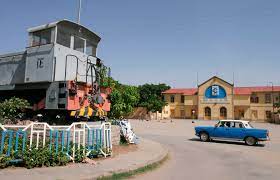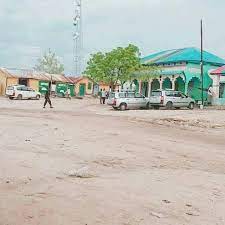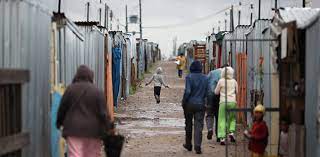Somebody, I think, gave me A Man Of Good Hope:One Man's Extraordinary Journey from Mogadishu to Tin Can Town (to give it its full title) by Jonny Steinberg a few years back. At first I took it to be a travelogue (something Simon Reeve or Michael Palin might undertake) and then I wondered if it might be one of those of so fashionable (at least a few years back) misery memoirs.
It certainly wasn't the former and though there were elements of the latter, a refugee's life is not an easy one, it is, far more than that, a story of hope and a story of coming to know one's self. A story, quite simply, about trying to make the best of the hand that life has dealt you. As narrated to Steinberg, who allows himself - when necessary - to become part of it, it tells the tale of a Somalian boy, and later man, Asad Abdullahi, and his extraordinary two decade journey from Mogadishu to Cape Town. Not just the physical journey but the mental journey. It also has things to say about war, migration, humanity, and inhumanity.
I found it a compelling, interesting, educational, and, at times, poignant read. Asad, at the time of writing, is living in Blikkiesdorp - Tin Can Town, an area that has been described as "Cape Town's asshole, the muscle through which the city shits out the parts it does not want". It's a ghetto of one room structures thirty miles from Cape Town's centre for people who have been evicted after illegally squatting elsewhere in the city.
Mostly South Africans but when Somali and Congolese refugees arrived there they find they are as unwelcome in Tin Can Town as they had been made to feel elsewhere in South Africa. What had brought Asad so far to a place so unfriendly and dangerous?
As with almost all migrants and refugees, it's a complicated story and one many of us prefer not to hear. To his great credit, Steinberg offered Asad 25% of any royalties received if he'd share his story and then set about visiting, if possible, the various places Asad had passed through and, again if possible, meeting with people who may have encountered him.
A Man Of Good Hope strives to, and I think succeeds in doing so, to tell a story of migration in the 21st century. In January 1991, militia men from the Hawiye tribe of Somalia attacked Mogadishu in an attempt to overthrow President Mohamed Siad Barre. Which they successfully did. They targeted all Darod men as they believed, one imagines mostly correctly, the Darod (or Daarood) clan were government affiliated.
Asad was, and is, Daarood. As a boy under fifteen he was not killed. Asad's father was a man however. Asad's mother was, of course, a woman and though Islam forbids the killing of women, the Hawiye were angry enough that day to orphan Asad. Not only had he lost both his parents, he also knew he had lost his home. Mogadishu was no longer safe for him.
So he left. As did thousands upon thousands of others. Before he had even reached the Kenyan border, his cousin Abdi (who was travelling with him) had been conscripted into a militia. From Kenya, Asad moved north (these migrant journeys are rarely direct) to Ethiopia where, in Addis Ababa, he would marry a woman called Foosiya for reasons that are both not exactly clear and more than a little disturbing.
Nevertheless he comes to love her and they set off, across Kenya (again), Tanzania, Zambia, and Zimbabwe to a new life in South Africa together. Or, sometimes, apart. Life in South Africa is not easy. Somalis and many South Africans have very different ways of looking at the world and South Africans begrudge Somalis for taking what they see as their jobs. South Africa, it has long been understood, is a very violent society.
There was always a dream, a hope, even a promise, that America would be his final destination and that there he would start a new life. Free from persecution and with opportunities most of us take for granted. But in South Africa, the country he made home, he found that xenophobia was rife and that people were happy to blame, and punish, foreigners like Asad rather than the government for their problems.
Asad sat in Steinberg's car, day after day, telling his life story and Steinberg, for his part, had to make decisions on when to prompt him and when to stay silent and let Asad speak. Steinberg agonises over these decisions but mostly makes the right call so that can he tell a story, in a warm and conversational manner - but with the occasional poetic flourish, of a boy/man who appears to have been "kicked through life like a stone".
A boy who, even on reaching manhood, despite being conscientious, capable, and hard working, struggled for agency, struggled for acceptance, and, on occasions, struggled simply to survive. The moments of joy (playing table football in Dire Dawa and long conversations when "talk is given freedom" in vans with friends) are not dissimilar to the joys most of us will experience in our lives but what is noticeable is how rare these moments are in Asad's chaotic and difficult life.
Many stories are harrowing. A rumour goes round Blikkiesdorp that the South Africans in Tin Can Town would celebrate the end of the World Cup they were hosting by killing the foreigners living alongside them and there are punishment rapes in Kenyan refugee camps where rapist gangs would discuss if disabled women were too "crippled to rape" or if they were still "rapeable".
Unimaginable horrors like these sit along tales that are, quite simply, sad. Not least in the fact that Asad can no longer remember what his mother looked like or how she sounded. Smaller details, too, upset. Asad sleeps on the floor under a plastic chair in Afmadow, he wipes an injured woman's bum and cleans her after she has her period, and he walks around the town of Wardheer in Ethiopia grinding his teeth so he can imagine what it feels like to eat a meal.
At one point, Asad feels elated when an older man who has taken him under his wing shouts at him. He knows that someone, just one person in the world, cares enough about him to be angry with him. The passion makes him feel alive. The casual cruelty which meets him so often does not. Anyone with an ounce of empathy would be taken aback by the offhand nature in which Asad is informed of a terrible family tragedy several years after it has taken place.
More distressing still is the systemic nature of it all. Asad knows that as a foreigner in a foreign land, and a migrant to boot, he is more likely to be murdered and that the police are less likely to care. He understands explicitly the racial disparity in South African society and society as whole. These experiences have left him almost scared to contemplate his past or his position in the world. The bigger picture is so daunting that it is easier, more bearable, to simply live one day at a time. Prioritise what needs to be done and get it done.
Asad is merely one of one hundred and sixty Somali refugees in Tin Can Town. There are other refugees there and elsewhere in South Africa and, of course, all over the world. According to a UNHCR report last year, there are over 84,000,000 displaced people on the planet. Asad's story, and versions of it - some considerably more harrowing, is repeated eighty-four millions times across this globe that we all share and that is the greatest tragedy of all.
Many of those refugees, or people to give them their correct name, would ,if not displaced, no doubt be helping to make the world a better place with their wisdom, kindness, and insight. Asad can see through the bullshit of the world and does so on many occasions. When he witnesses a Somali man chase his sister through the streets with a pistol to protect the family's honour because she'd become pregnant while unmarried he remarks on the macho stupidity of it, noting that honour is a "thing you can't even see, let alone eat or drink".
It's a wisdom that is lost on many of us who live safer and wealthier lives and yet, in many cases, still choose to demonise those like Asad who face far more difficult and deadlier challenges. Jonny Steinberg, and Asad himself if he but knew it, have, by shining a light on one individual story, proved the lie peddled by those on the far right that refugees are somehow criminals and scroungers.
They are, of course, humans like you and I. They want to be safe, they want a roof over their heads, they want to be able to afford food and drink, and they, more than anything else at all, want for their children to have a better life than they have had. They are doing their bit to make that happen. Perhaps it's time we helped out. I can't remember who it was who gave me this book but I'd like to thank them anyway for an emotional, sometimes very raw, and sometimes quite upsetting but also a fascinating and worthwhile read.












No comments:
Post a Comment